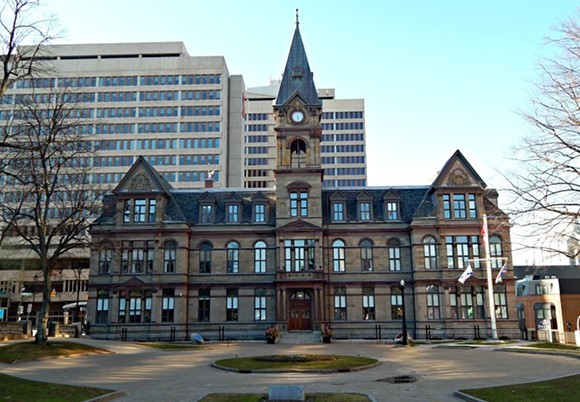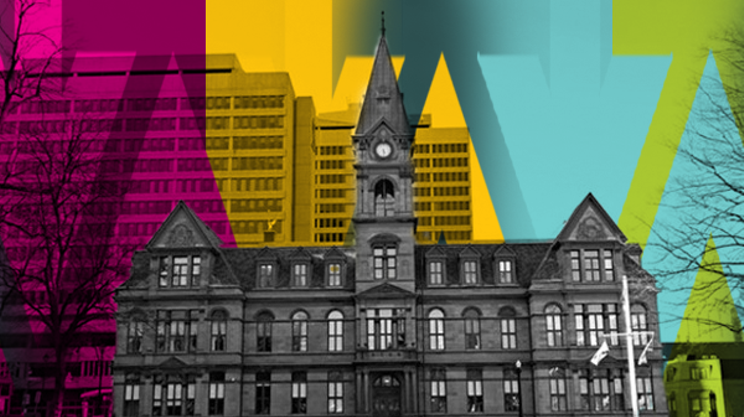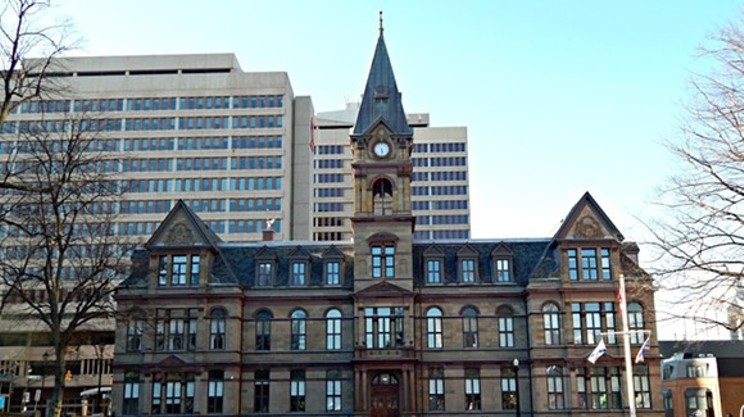Building permit fees will be going up 25% on April 1, a move that will net the HRM an additional $1.45 million in revenue. These fees are governed by the Fees By-Law F-200. This fee hasn’t been adjusted since 1997, and currently sits at $5.50 per $1,000 of the estimated value. It will go up to $6.90 per $1,000. Planning and development boss Kelly Dente told the city's budget committee last week that if this fee had kept up with the consumer price index, it would be at $9.30. The new rate in Halifax is about a dollar lower than the national average.
Development fees, for those who don’t know, are supposed to make the developer pay for access to municipal services: Things like water, roadways and transit. Essentially, it costs money to connect privately developed buildings to public services, and the increased use by the private building increases the maintenance costs to the city. The city recoups these costs through fees and taxes. The fees aren’t enough to cover the cost to connect, and this article covers how the taxes don’t cover the maintenance.
In this debate, councillor Waye Mason pointed out that if a parent wants to rent out a pool for their kid's birthday party, the rental fee is structured to make sure the city doesn’t lose any money. When developers ask to develop land for private gain, the fees are structured to make exploiting the value of public land as cheap as possible. It is slightly insane for the city to demand higher fiscal responsibility from a parent planning a five-year-old’s birthday party than a developer planning a multi-million dollar development.
Council unanimously voted to increase development fees by 25%.
Since the budget committee and city council are the same people, except with Mayor Mike Savage and councillor Paul Russell switching chairs, and because they were all in agreement that this fee increase should come to pass, they wanted to know if they could skip the budget process and just implement this fee increase as a piece of legislation. Turns out they can; a committee can send something to council for consideration. The budget committee has used this process twice in the past few budget meetings, which is why at Tuesday’s city council meeting there will be second reading of legislation to increase permit parking fees and building permit fees. Pretty cool stuff (for nerds)!
Of course, Tim Houston’s provincial government could veto this legislation with the power it gave itself in the fall sitting, although city staff say they do not believe that is likely with this fee increase.
The city is going to also consider funding some consultants during the budget adjustment debates at the end of March, when councillors will finalize the budget.
One set of consultants, at a combined fee of $450,000, will help the city finish the long-awaited rural and suburban planning documents, as the city did with the centre plan. If the suburban planners ($250,000 of the $450,000) can break the city out of the suburban Ponzi scheme, there is no better investment the city can make.
Council is also considering hiring some consultants to do “community action planning for African Nova Scotian communities,” to the tune of $276,200. This is needed because municipal planning in African Nova Scotian communities has been woefully (or maliciously) neglected since 1783.
And the committee is also going to consider spending $120,360 for two building inspectors for the upcoming rental registry.
The rest of planning and development’s $14.4 million budget got approved, although the building permit fee increase will reduce this department’s budget to $13 million.
The auditor general’s $1,195,700 budget was sent along. The AG is a vital service to public accountability, and her office is worth its weight in gold. For example, who found out the police IT infrastructure was putting our information at risk? The auditor general. Who found out the police were lying to the oversight body about fixing it? The auditor general. Should the police have been able to lie to their oversight body for over five years about progress made on audit reports without that oversight body catching it? You’d think not.
Sadly, police breaking the rules and the oversight body not noticing happens all the time. It happened in this budget process.
All that to say, the auditor general’s office knows how to do oversight.
And finally, the budget meeting will continue this week on Wednesday, Feb. 21 where the committee will work its way through this absolutely brutal list of proposed budget cuts. Staff were asked to present options to the budget committee, because some members of our municipal council want to keep taxes low. Below are the ways council can keep taxes low in the parks budget.
It should be noted that this budget also has a cut that will kill the arts in Halifax. Not hyperbolically—literally. As a result, a lot of people came to speak out against the proposed cut, saying it was foolish for this trivial amount to be cut when the city spends so much on police. To give you an idea of why people make that argument, all of the proposed parks cuts below will also include their percentage of the police budget.
The city could make $45,000 (~0.0004% Of The Police Budget) by charging fees to use the new Commons Aquatics Centre. City staff say in their briefing note that it would be hard to charge fees in a way that wouldn't inadvertently shame poor people for using the pool. They also point out that any program put in place to prevent this stigmatization would present “logistical challenges.” The challenge here is this: The pool is a public good, made with public money. Which means everyone in the public should have access to it. The city could open it up for free and pay for it out of the operating budget, as Charlottetown, PEI does with its pool at Victoria Park. The city could charge a fee to use it, but then how does the city ensure people who can’t afford the fee still have access to the public good they helped pay for? The city tried to dance that line when it increased MyRec fees, but last summer councillor Tony Mancini pointed out that administrative programs to lower fees for the lower class just means the lower class doesn’t get access to public goods they pay for. So, council can save $45,000 by punishing the city’s poorest swimmers.
It could sell the naming rights to the aquatics centre, which could net the city $100,000 (~0.001% OTPB) a year. Could council sell the naming rights for $145,000 and cover the fees too? Probably. Emera pays half a million for the naming rights for the oval. Fun fact though, people can call it whatever they want. And if Emera wanted a good name, it should probably spend that money on maintenance.
The city could save $155,000 (~0.0016% OTPB) by not having a person work at five all-weather turf fields when they are open. These people are responsible for setting up the corner flags, maintaining the nets and cleaning up when teams invariably leave a mess behind. If there’s a dispute about who booked the field and when, this person helps sort it out. Want to know who’s likely to be called upon sometimes to resolve that dispute without a field manager present? The police. As a reminder, 459 of the HRP’s cops made over $100,000 in 2022.
The city is switching from mowing some green spaces to a naturalization strategy. Naturalization is the process of switching from bad-for-the-planet monoculture grass, turning the spaces instead into a natural habitat for pollinators. And we need pollinators because they are disappearing at an alarming rate in the ongoing sixth mass extinction event in history. The city could not expand the program as planned, saving $150,000 (~0.0015% OTPB) and making the planet a little bit worse. The city of Calgary has a guide for people who’d like to naturalize their lawns. Click that link if you want to prevent your lawn from contributing to climate change.
The city could save $50,000 (~0.0005% OTPB) a year by not mowing the bits of lawn between the sidewalk and the curb, leaving that responsibility to the individual property owners instead.
The city can save $196,000 (~0.002% OTPB) by not setting up the Lake Banook race course. For hockey folks, this is a bit like cancelling Zambonies to save money. This is the only aquatic race course of its kind east of Montreal and, as a result, is a big driver of tourism in the paddling world.
The city could save $2.4 million (~0.025% OTPB) by cancelling the Grand Oasis Concert Series. If the concerts go ahead, the city will also likely pay the Halifax Regional Police for extra duty cops, so a small part of the city’s arts funding would help contribute to the police budget.
The city could kill the whole arts scene to save $1.2 million (~0.01% OTPB). The whole thing. Museums, theatres and art galleries—just gone. History, lost forever. A part of the city’s soul could be ripped out to save less than 0.002% of the city’s overall budget. So that’s cool.
It’s not cool. Every politician loves to talk about tourism and how important it is for the Nova Scotian economy. Yes, Nova Scotia has beautiful landscapes, but people come to Halifax because it’s a cool city. They take their first road trip with their best friends in university, they come for a comedy festival at the casino or a cool band at the Seahorse. They catch a world-class play at the Neptune. Every bar has live music, good live music, almost every night. We are spoiled with the arts. We are cool because of the arts. Suffering can make good art, but suffering is not, and should not be, a prerequisite for art. The cool people who tell our stories better than we can—tell our stories back to us for us to better understand and experience our humanity—also need to eat. Bustop Theatre says council needs to do more than just save the arts, and is starting a public action campaign encouraging people to write to their councillors in support of the funding. They identify the following districts and councillors as requiring a bit of an extra public motivation: Cathy Deagle Gammn (District 1), David Hendsbee (District 2), Becky Kent (District 3), Trish Purdy (District 4), Tony Mancini (District 6), Shawn Cleary (District 9), Iona Stoddard (District 12), Lisa Blackburn (District 14), Paul Russell (District 15) and Tim Outhit (District 16). These councillors appear to have been selected for a few reasons, likely due to the rural nature of their ridings, previously making arguments for lower taxes, being relatively quiet in debates leaving their position unclear, or being named Shawn Cleary.
The city can make PD days slightly worse for parents by not giving the Discovery Centre $145,000 (~0.001% OTPB) and saving that money instead.
The Dartmouth Heritage Museum can be executed to save the city $100,000 (~0.001% OTPB). This may or may not be in contravention of an agreement signed in 1996, but things like “past commitments” have never stopped politicians from “adapting to new political realities.”
The Sackville community arena is run by a non-profit; it does things like “maintain the state of good repair” and run the Zamboni. The city could save $50,000 to axe this. This is like not setting up the Banook race course for the paddling folks.
The city could save $100,000 by keeping at-risk youth at risk in Spryfield. At-risk youth are children who, without public services like Multi Purpose Centre Spryfield, probably grow up to be statistics that justify increasing the police budget.
The city can save $20,000 (~0.0002% OTPB) by not painting lines on sports fields. One of the risks listed is “reputational damage if the fields are not lined.” Yeah, because it would be super embarrassing that a “world-class” city in one of the “richest countries in the world” is pinching pennies by not painting lines for their children to enjoy organized sports. Staff’s right, but there’s also a lot of “reputational damage” because we’re at the point where this is even being considered.
Shrubs could be removed from cul-de-sacs to save $20,000 a year. People might complain. Oh no.
The city can skimp on putting garbage cans on sports fields, saving $100,000 a year. This would likely result in more garbage being thrown on the ground. Good thing there’s someone working there to pick that up. Oh, wait.
The city can save $500,000 (~0.005% OTPB) a year by removing the affordable access to city recreational programming. The city’s MyRec program is absolutely phenomenal. It’s a lot of things, but it’s also the public version of kids’ activities. For example, the HRM’s preschool sports programs are the public version of the local Timbit sports programs. Because it’s public, it has fewer bells and whistles (like colour-coordinated Tim Hortons branding, for example) and costs less. The money up for debate goes to making the already lower cost even lower for those among us who are being absolutely destroyed by capitalism but still want our kids to have a somewhat normal childhood in spite of that. Removing this money would hurt those people, almost exclusively. Sports are good for kids. The arts are good for kids. The people who would be hurt the most by this are the people who are already being hurt the most. This is an option on the table. Staff has not included reputational damage as a potential negative.
The city staff needs to hire a few more people to help with all the quirky stuff the city does, like lighting Christmas trees or waving at one as it leafs for Boston. Sorry if that pun needled you; just fir-get about it. Tree puns are a measurement of genus and not one of Penus. Moving on. The city could not do that fun stuff and save $75,000 (~0.0007% OTPB) a year.
Editor's Note: Right after this story ran, city council had a meeting and sent the homeless strategy, the full $1.1 million, to the Budget Adjustment List for consideration, along with a city-funded street navigator for an additional $150,000. The item below will not be considered on Wednesday's meeting as it's already been sent to the BAL.
The city is planning on spending $334,800-$1,132,800 (~0.003%-0.0118% OTPB) to figure out how to provide the bare minimum to unhoused people. This is, quite literally, pedantically, a property tax rate debate. So the city can decide not to spend this money, letting everyone know that saving money for people with houses is more important than a human being having their basic needs met. Reputational damage is also not listed here as a possible negative impact of axing this.



